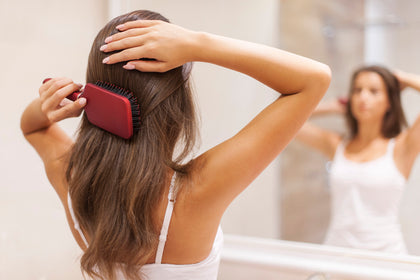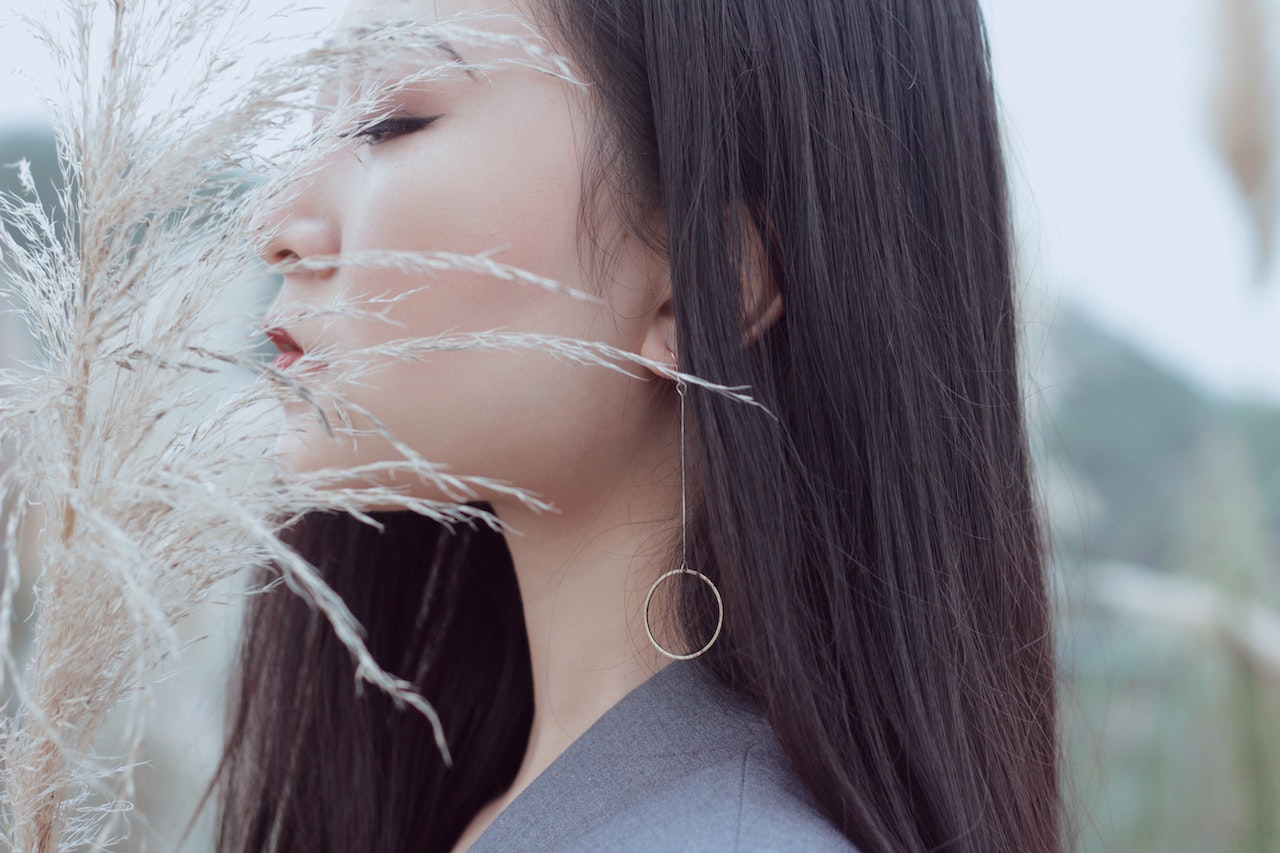A burning sensation can occur anywhere in the body, and it might feel like heat, pins and needles, or a sharp, prickly pain. It's your body's way of sounding the alarm that there's something serious going on internally that deserves your attention. A burning sensation on your scalp often accompanies hair loss, but to stop the burn and prevent further hair loss, you'll want to get to the root of the problem — quickly, before any more damage is done.
Curious about what might be causing burning scalp hair loss? We consulted with an expert who laid out the potential causes and what you can do about it. Read on to learn more, including what products you should be using to support scalp health.
What's Happening When You Have a Burning Scalp?
A burning scalp may present as a tingling sensation at the base of the hair follicles. If you touch your head, it might feel as if pins are being stuck into your scalp. A cursory online search might lead you to a condition called burning scalp syndrome, also known as scalp dysesthesia or trichodynia (which literally translates to "hair pain" in Greek). However, scalp burning is a symptom of multiple scalp and skin conditions – not just burning scalp syndrome. Keep reading to learn why you might be experiencing a burning, itchy scalp and losing hair.
Shop: The Perfect Kit for Scalp & Hair Health
What Conditions Can Cause Burning Scalp and Hair Loss?
A variety of different conditions can cause you to experience a burning sensation on your scalp accompanied by hair loss. Here are a few.
Burning Scalp Syndrome
Burning scalp syndrome is the first thing you'll find when you look up your scalp symptoms. Also known as trichodynia and scalp dysesthesia, burning scalp syndrome commonly affects people suffering from hair loss conditions, such as androgenetic alopecia (male or female-pattern baldness) and telogen effluvium (hair loss as a result of increased shock or even trauma).
The most common signs and symptoms of burning scalp syndrome include:
- Burning sensation on the scalp
- Scalp itchiness
- Scalp irritation
- Prickling sensation on the scalp
- Redness
- Increased hair loss
- Increased hair shedding
The exact cause of the condition is still unknown, but researchers suspect that conditions such as stress, anxiety, and depression may be linked to burning scalp syndrome.
Related: Why Does My Hair and Scalp Hurt? Doctors Explain
Telogen Effluvium
Sometimes, a symptom of telogen effluvium is trichodynia, or hair pain presenting with symptoms such as tenderness, pain, burning, itching and stinging. One study suggests that telogen effluvium and trichodynia are probably related, although the underlying mechanisms creating the pain are unclear. Hair loss caused by telogen effluvium typically resolves on its own, but if the painful tingling sensation and itchy scalp become too much to bear, talk to your doctor about getting some additional bloodwork done to rule out underlying medical causes like thyroid disease, anemia or vitamin deficiencies.
Inflammatory Scalp Disorders
A variety of inflammatory scalp disorders can trigger a painful sensation on the scalp, including scalp psoriasis, seborrheic dermatitis, atopic dermatitis on the scalp, scarring alopecia and tinea capitis. These conditions can cause scaly patches and a dry scalp, and excessive scratching could lead to temporary hair loss.
"When you are experiencing burning scalp with hair loss, that means there is an active infection which causes inflammation and sensitivity," said hairstylist Keka Heron. "Individuals suffering from androgenic alopecia experience their nerves being extremely sensitive with any touch."
Topical anti-inflammatory treatments can have a soothing effect on dry, irritated skin.
Allergic Reactions
The chemicals in hair dye or other hair care products could cause an allergic reaction. The most common reaction to harsh hair care products is allergic contact dermatitis, which is also associated with burning in some cases. Once the product that's causing the allergic reaction is identified, removed, and replaced with more gentle hair care products, the painful sensation should cease.
Also: Do You Know Your Scalp Type?
Autoimmune Conditions
Autoimmune diseases such as alopecia areata may bring on a burning or itching sensation in the affected areas. Autoimmune disorders develop when the body mistakes healthy cells or tissue for foreign invaders and attacks the healthy cells. With alopecia areata, hair loss occurs in clumps, often around the size and shape of a quarter. Some people report feeling a tingling, itching, or burning on the skin right before they lose their hair. The main strategy for treating alopecia areata involves suppressing the immune system’s attack and/or stimulating the hair follicle to encourage hair regrowth.
Read: Can Lupus Cause Hair Loss?
Can a Burning Scalp Cause Hair Loss?
A burning scalp and hair loss go hand in hand. While a burning scalp doesn't directly cause hair loss, it's often indicative of a scalp or skin condition that could lead to hair loss. Although it's uncomfortable, the good news is that if you're experiencing a burning scalp, it’s neither permanent nor untreatable. Once you get to the source of the symptoms and find a treatment that works for you, you're one step closer to thicker, fuller and healthier hair.
What Can You Do If You're Experiencing Burning Scalp and Hair Loss?
If your hair pain persists or if you have a more serious scalp condition, here are a few of the best ways to improve your hair's condition.
Use Gentle, Plant-Based Hair Products
VEGAMOUR's GRO Scalp Detoxifying Serum gently removes scalp buildup while soothing the skin. At the same time, the serum works to absorb excess oils while reducing scalp irritation, providing visible relief in as little as three days.
VEGAMOUR's products work best when paired together, so also consider giving your strands a boost with a hair serum that promotes overall hair wellness. GRO Hair Serum is a revolutionary formula that contains a blend of mung bean, red clover, curcumin and more to help support a healthy and balanced follicular ecosystem while soothing the scalp and revitalizing hair at the root. It's also 100% vegan and cruelty-free and can help support the appearance of longer, denser, thicker, healthier hair.
If you're experiencing both thinning hair and scalp issues, the Good to GRO Kit includes two products designed to address both your hair and scalp challenges. Plus, it comes at a discount when you purchase a kit!
Scalp Massage
Scalp massage can help promote increased hair thickness by activating the dermal papilla cells in the subcutaneous tissue. Studies suggest that scalp massage works by increasing blood flow or by stimulating hair cells.
Try a hand-held scalp massager to stimulate the scalp while reducing product buildup and removing dead skin cells, boosting scalp health.
See a Doctor
Hair loss is extremely complex and can be caused by or impacted by a wide variety of factors. A burning scalp is an uncomfortable and potentially serious condition. If you're experiencing a burning scalp, it's wise to consult with your doctor for diagnosis and treatment. While lifestyle changes may alleviate the symptoms, doctors can get to the root cause of hair loss, preventing further hair loss down the line.
Up Next: Want Thicker, Fuller Hair? Try This Best-Selling Serum
Scalp Health Is an Indicator of Hair Health
For stronger, healthier hair, cultivate a wellness routine that nourishes your scalp from the inside out. To upgrade your hair care routine, explore VEGAMOUR's extensive range of powerful plant-based products. From hair serums for thinning hair to supplements with bioavailable adaptogens and minerals, how you nourish your body will also impact the look of your hair and scalp. For optimal overall hair health, treat your scalp to a little TLC and high-quality products, and watch your strands shine from end to end!
#include-related-slider#
More From VEGAMOUR
- Shop: The Best Products for Dry Scalp
- Does Wearing a Hat Cause Hair Loss?
- What to Do If You Have a Scalp Sunburn




















